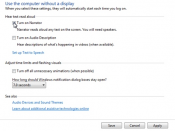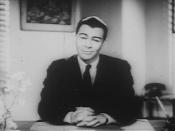Note: I was unable to include the footnotes which correspond to the quotes used.
Invisible Man Essay
Throughout Ralph Ellison's Invisible Man, the unnamed narrator constantly questions his identity in many ways. While his immediate concerns, such as why he was where he was or what he should do there, changed on a situational basis; he consistently put to question the idea of his "invisibility." Though the definition of invisibility was always constant to the narrator, that others could not and would not see or hear him, the impact and his resulting feelings towards invisibility changed as he grew and experienced more. At the outset of the novel, the narrator viewed his invisibility as a barrier to what he hoped to accomplish, but by the end he understood that his invisibility was his sole defense against his tyrannical and unjust surroundings. Analysis of the changing emotions caused by the conflicts with invisibility and his identity provide much evidence to show that there is a transformation from invisibility being a negative attribute to being a positive endowment, which would provide the narrator opportunities otherwise invisible themselves.
"And my problem was that I always tried to go in everyone's way but my own. I have also been called one thing and then another while no one really wished to hear what I called myself." This statement shows that the narrator's sense of his own invisibility was something he associated closely with his inclination to readily adopt the ideas and views of those around him. While his longing for power and respect was presumably his own, his strong efforts in every attempt to achieve these goals were always based on the ideas of others. For example, his desire to do well at the college was likely due to the common thought that...


